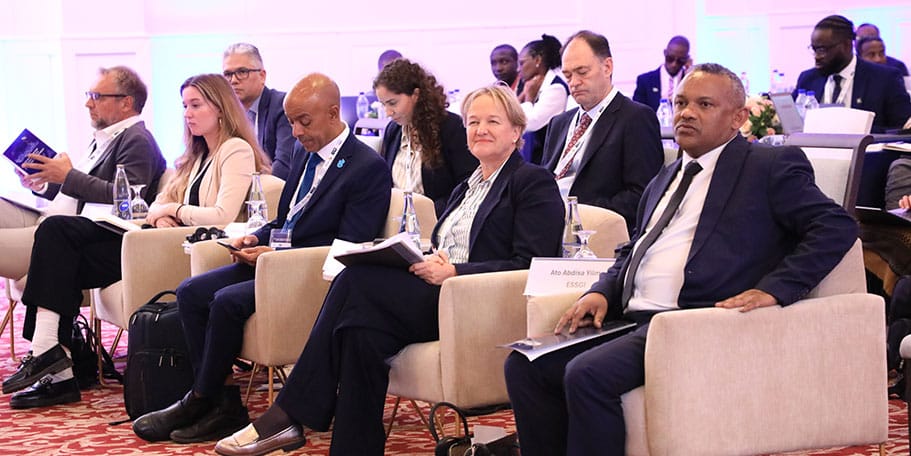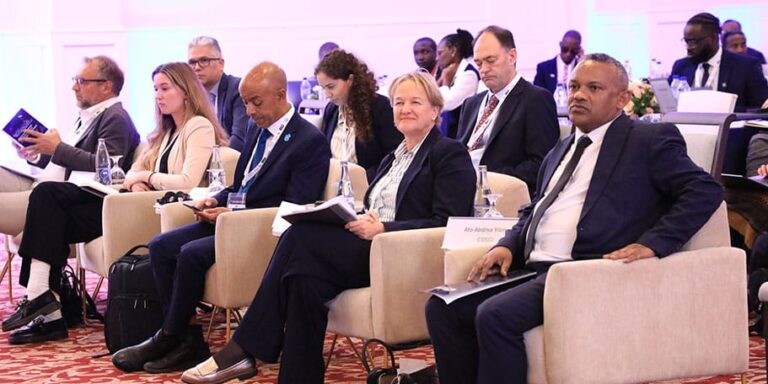Africa’s water resources are coming under mounting strain, driven by population growth, intensifying climate shocks, and declining water quality, experts warned this week at a high-level symposium in Addis Ababa. The gathering underscored the urgent need to harness data and digital technologies to better manage the continent’s most vital resource.

The Pan-African Symposium on Digital Solutions for Water Management, held from October 21 to 23 at the Haile Grand Hotel, brought together government leaders, scientists, and technology experts from across the continent. Co-convened by the International Water Management Institute (IWMI) and Digital Earth Africa (DE Africa), with support from The Helmsley Charitable Trust, the three-day event explored how innovation can help build a more water-secure and climate-resilient Africa.
Participants included officials from Kenya, Uganda, Zambia, Burkina Faso, and Ghana, as well as representatives from the World Bank, the Nile Basin Initiative, and the UN Economic Commission for Africa. Alongside policy discussions, the symposium featured technology showcases and case studies highlighting how digital tools are reshaping water management across East, West, and Southern Africa.
From The Reporter Magazine
At the heart of the meeting was a shared objective: to chart new pathways for managing water resources more efficiently and equitably. Speakers emphasized that both Ethiopia and the wider African region are increasingly embracing digital innovations to confront water insecurity and climate risks.
Experts at the symposium described a continent grappling with intensifying floods, droughts, and water scarcity—all exacerbated by climate extremes. Yet, they noted, a more fundamental challenge lies in the lack of reliable data. Without adequate data systems, governments are effectively navigating blind, panelist remarked, warning that the absence of comprehensive water information undermines planning and policy responses.
Closing this “data gap,” participants agreed, is critical. Digital innovations—from satellite imagery and geospatial analytics to real-time monitoring platforms—were presented as powerful tools for bridging that divide.
From The Reporter Magazine
AbdissaLema, director-general of the Ethiopian Space Science and Geospatial Institute, said his institution has established nine specialized sectors to collect and analyze data supporting national development efforts. Among them is the Water Management Centre, which monitors and evaluates changes in the country’s water resources over time.
“We are now working to provide better data services to the sector,” Abdissa said. He added that the Institute’s work supports national projects, including the Grand Ethiopian Renaissance Dam (GERD), and enhances broader water management efforts across the country.
Digital innovation, he noted, has become indispensable to improving efficiency and service delivery. “We use digital technologies as a means to enhance productivity and make our work more effective,” he said.
AbdulkarimSeid (PhD), IWMI’s representative for Ethiopia and East Africa, echoed the sentiment, describing digital innovation in water management as a “rapidly expanding” frontier. The approach, he said, enables more efficient and reliable decision-making by providing accurate data and strengthening operational systems.
Seid added that IWMI’s initiatives aim to build the capacity of water professionals, foster knowledge exchange, and promote collaboration among African institutions.
Expanding on the role of innovation, Seidobserved that much of Africa has yet to fully harness its abundant water resources — particularly for irrigation. Despite vast river basins and aquifers, he said, most Sub-Saharan countries remain heavily dependent on rainfall, a reliance that has become increasingly risky as climate variability intensifies.
“With all these persistent challenges that the continent is facing, we believe digital innovation can bring foundational change,” Seid said, “by providing credible data on water management and resource capacity to address the effects of climate change and other related issues.”
He emphasized that expanding investments and improving natural resource management are crucial if African countries are to reap the benefits of their available water systems. As an example, he cited the Grand Ethiopian Renaissance Dam (GERD) — a landmark project demonstrating how infrastructure investment can unlock national and regional development.
Yet, Seid cautioned, such success depends on effective data governance and digital integration.
“Any investment expansion requires proper planning and data management,” he told The Reporter. “The application of digital innovation to project investments is vital — not only for development but also for the sound management of natural resources.”
Throughout the symposium, experts reiterated that integrating data from digital platforms, satellite observations, and artificial intelligence can dramatically improve water monitoring, planning, and use. By combining these tools, countries can better track water flows, anticipate shortages, and make informed policy decisions.
Speaking to The Reporter, Rachael McDonnell (PhD), deputy director general of IWMI, said the fast-evolving digital landscape is opening new frontiers for water management. The institute’s initiatives, she noted, aim to merge “the latest ideas, datasets, and technologies” to help governments, investors, and African organizations make evidence-based decisions.
Collaboration, McDonnell stressed, remains central to this effort. “Africa faces growing water stress both within and across national borders,” she said, citing surging demands from agriculture, energy production, and expanding data centers. “Accurate and timely data — from the community level to the continental scale — is essential to ensure water security.”
She added that understanding where water exists and how it is used lies at the core of building sustainable systems for food, energy, and human development.
Over the past 15 years, McDonnell said, Earth observation technologies have transformed how experts understand water distribution, providing new insights into who uses water and where. Integrating these digital records, she added, allows governments to align future water planning with national priorities and local realities.
“The wonderful thing about water,” she reflected, “is that while we might make daily decisions, most of the crucial ones are monthly or seasonal. We need to link that knowledge to national policies and investments to ensure water is managed effectively — for both farming systems and urban communities.”
Since its founding in 1984, IWMI has worked to address critical water-related challenges in East Africa — from environmental degradation and climate risks to water security and cross-border collaboration.
Images are for reference only.Images and contents gathered automatic from google or 3rd party sources.All rights on the images and contents are with their legal original owners.

